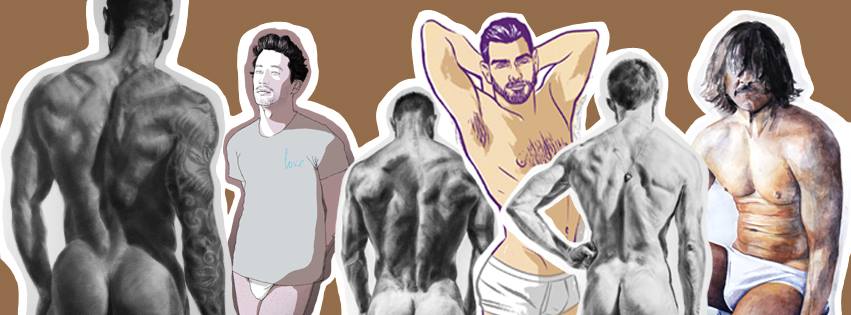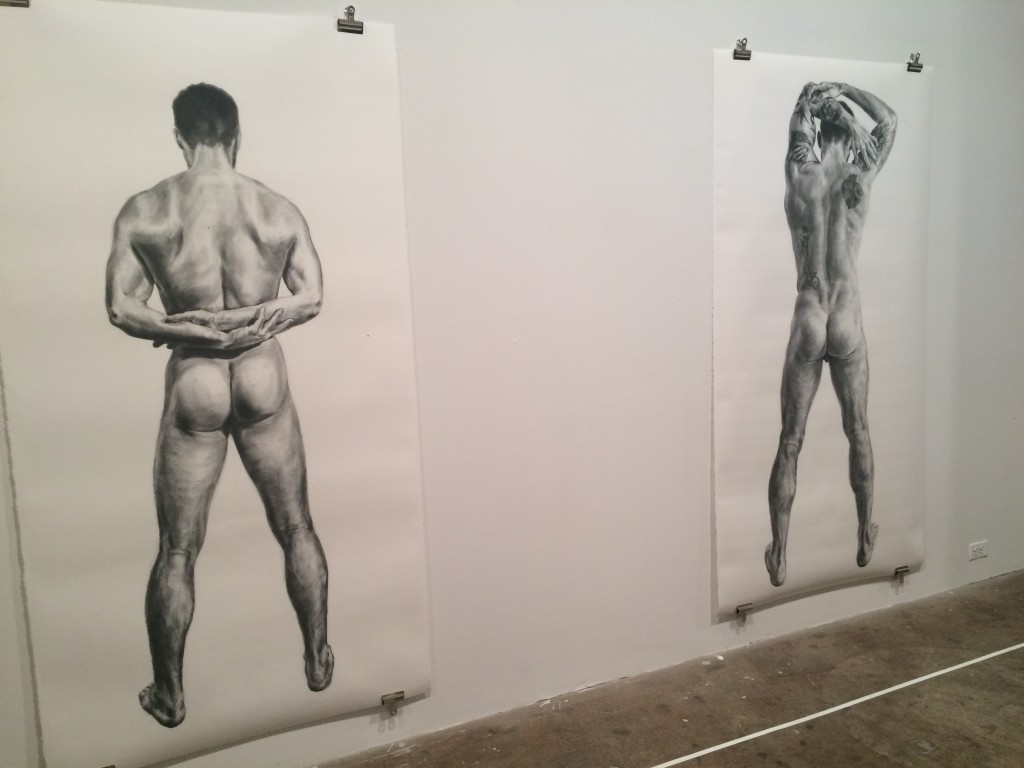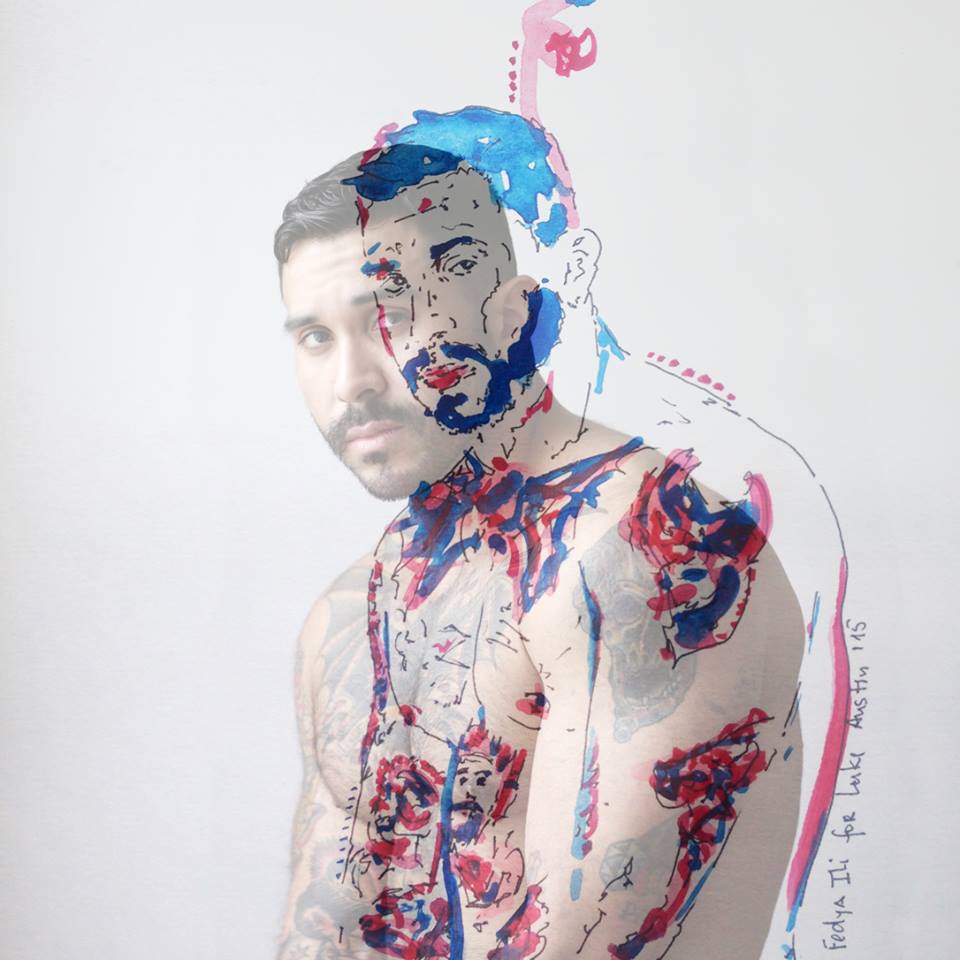A Review of John MacConnell’s solo show “Instant Gratification” and Luke Austin’s “Double Vision” book release at The Highline Loft
Author | Manuel Betancourt
Featured Image: Inside @lukeaustinphotosthe3rd‘s Mini Beau Book 4 “Double Vision”: Photo by @lukeaustinphotosthe3rd, Art by Alfredo Roagui, @roagui
Collage by @lukeaustinphotosthe3rd:
“That it was a scorching hot evening had all of us keenly aware of our sweaty and sweltering bodies which ached to match the nudes hanging all around us further underscored the public intimacy which gallery spaces epitomize…”
“There’s nothing more public than privacy.” Those words, from Michael Warner and Lauren Berlant’s seminal text “Sex in Public” echoed in my head as I walked into the High Line Loft space last night for the opening of John MacConnell’s solo show “Instant Gratification” and Luke Austin’s “Double Vision” book release. I’ve followed John’s work for over a year and a half now (and even commissioned a piece of his last year to celebrate my third year anniversary with my boyfriend). His life-sized charcoal posters of nude men facing away from his gaze (both enticing and disavowing the artist’s gaze?) were sketches of models that he’s met through Instagram — the very same way I stumbled onto his work.Indeed, as I walked around the space and enjoyed the variety in Austin’s newest project, which I’d seen percolating on Instagram for months now, what little public privacy was afforded these artists and their models seemed to give way to something much more fascinating, especially as the models there depicted walked around me, drank some wine, and existed in tandem with the photographic and artistic renditions of their naked bodies perched on the walls.
Art by @johnmacconnell (Photo by @bmanuel):
This was a surreal experience not only because it was an oppressively attractive bunch (models and dancers, am I right?) but because I’m not used to being in a room with so many people whose faces, torsos (and in some cases, plenty more) I’ve scrolled through and have come to know intimately, if from far away. Instagram encourages this specific type of mediated intimacy; those of us who post pictures of our breakfast, of our sunset views, and ourselves ask our followers to share in our lives. This is further exacerbated when we offer up our bodies (whether clothed and demure, or flagrantly nude and inviting). Instagram explicitly restricts the use of mature and nude content: “We know that there are times when people might want to share nude images that are artistic or creative in nature, but for a variety of reasons, we don’t allow nudity on Instagram” they write in their Community Guidelines. The subset of users I follow (and who find themselves the center of attention of the photographic and artistic gaze of Luke, John and every other artist represented at the showing) clearly do not abide by this, though it is worth noting that Luke’s handle (@lukeaustinphotosthe3rd) is a thinly veiled allusion to the number of times instagram has disabled his account for violating these very terms.
Image from @lukeaustinphotosthe3rd‘s Mini Beau Book 4 “Double Vision”: Photo by @lukeaustinphotosthe3rd, Art by Fedya Ili, @ifedya:
It’s one thing to like an Instagram post of someone in various states of undress (that hovering heart disappears faster than I can scroll through to the next picture of a gorgeous building, a cute puppy and/or another artistically-shot nude on my feed). But it is quite another to see that same person in, well, the flesh. That it was a scorching hot evening had all of us keenly aware of our sweaty and sweltering bodies which ached to match the nudes hanging all around us further underscored the public intimacy which gallery spaces epitomize; your encounter with these pieces is wholly individual yet entirely communal. The show, by focusing on seemingly private moments (boys in various states of undress, sharing what would normally be deemed a private moment were it not for the obvious gaze of the artist/photographer) made the show and its social media genesis all the more timely.
In Camera Lucida, Roland Barthes’s 1980’s meditation on photography, he noted that given the ubiquity of photography in the late twentieth century, he noticed how “once I feel myself observed by the lens, everything changes: I constitute myself in the process of ‘posing,’ I instantaneously make another body for myself, I transform myself in advance into an image.” With Instagram’s increasing popularity as an outlet for amateur and professional photographers alike, we cannot possibly begin to fathom how ingrained our process of ‘posing’ is, especially when said poses are fodder for likes, follows, and a number of fleeting if meaningful connections with strangers that may know you more intimately for the very fact that they don’t know you at all. What I experienced last night at the High Line Loft, as I got silent nods from people I only know through online interactions and when I second-guessed every other face (had we actually met or did he looked familiar given I’d just spent minutes staring at his naked picture up on a wall?) was akin to seeing the type of queer space Warner and Berlant thought would completely disappear. Rather than see a queer community disappear into the “privatized virtual public” of the internet, as they both wrote in 1998, this collaborative showing (which also included a cheekily white tee that simply had the word “Like” on it, designed by Adam J. Kurtz) showed the very potential of online mediated intimacies, blurring the lines between public and private. It was a success in that respect, bringing together an online artistic scene, creating a space which offered the very instant gratification and double vision MacConnell and Austin both promised.
You can catch the showings at the High Line Loft Suite 5D this weekend. Visit the gallery from 1-4PM on Saturday May 30th and catch John MacConnell in person.



